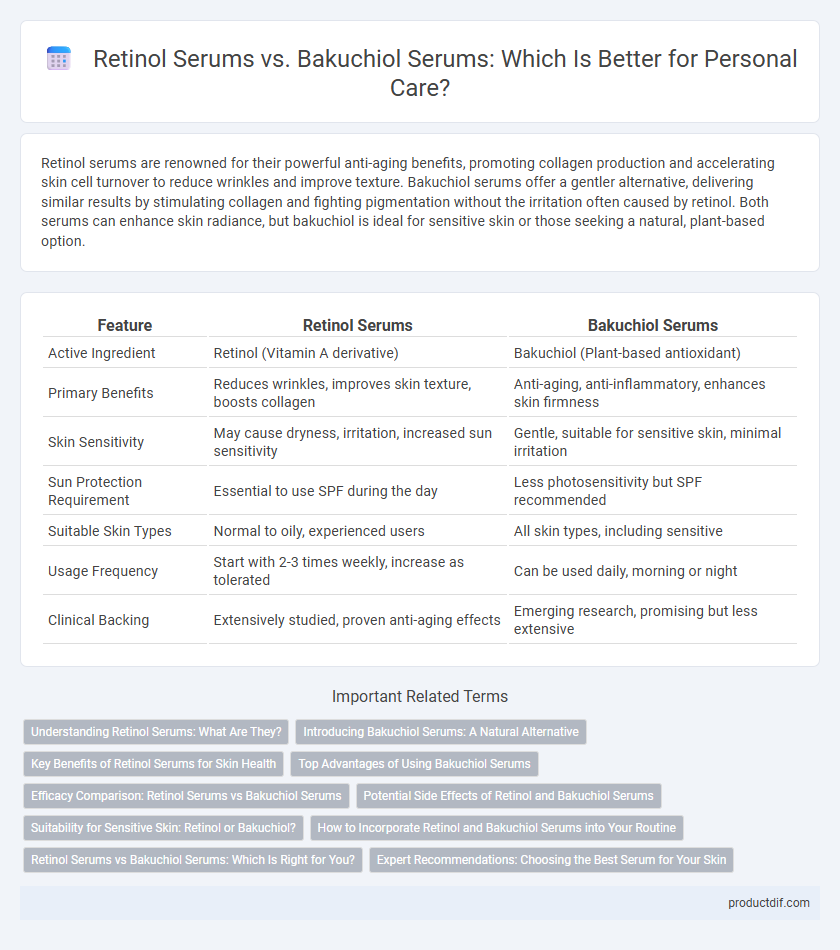Retinol serums are renowned for their powerful anti-aging benefits, promoting collagen production and accelerating skin cell turnover to reduce wrinkles and improve texture. Bakuchiol serums offer a gentler alternative, delivering similar results by stimulating collagen and fighting pigmentation without the irritation often caused by retinol. Both serums can enhance skin radiance, but bakuchiol is ideal for sensitive skin or those seeking a natural, plant-based option.
Table of Comparison
| Feature | Retinol Serums | Bakuchiol Serums |
|---|---|---|
| Active Ingredient | Retinol (Vitamin A derivative) | Bakuchiol (Plant-based antioxidant) |
| Primary Benefits | Reduces wrinkles, improves skin texture, boosts collagen | Anti-aging, anti-inflammatory, enhances skin firmness |
| Skin Sensitivity | May cause dryness, irritation, increased sun sensitivity | Gentle, suitable for sensitive skin, minimal irritation |
| Sun Protection Requirement | Essential to use SPF during the day | Less photosensitivity but SPF recommended |
| Suitable Skin Types | Normal to oily, experienced users | All skin types, including sensitive |
| Usage Frequency | Start with 2-3 times weekly, increase as tolerated | Can be used daily, morning or night |
| Clinical Backing | Extensively studied, proven anti-aging effects | Emerging research, promising but less extensive |
Understanding Retinol Serums: What Are They?
Retinol serums are skincare products containing a vitamin A derivative known for its powerful anti-aging and skin-renewing properties. They work by accelerating cell turnover, stimulating collagen production, and reducing fine lines, wrinkles, and hyperpigmentation. These serums are widely used to improve skin texture, tone, and overall radiance, but may cause sensitivity requiring gradual introduction into a skincare routine.
Introducing Bakuchiol Serums: A Natural Alternative
Bakuchiol serums offer a natural alternative to retinol, derived from the Psoralea corylifolia plant, known for its antioxidant and anti-inflammatory properties. Unlike retinol, bakuchiol provides similar benefits such as improving skin texture, reducing fine lines, and promoting collagen production without causing irritation or photosensitivity. This makes bakuchiol serums ideal for sensitive skin types seeking effective anti-aging and brightening results with gentle, plant-based ingredients.
Key Benefits of Retinol Serums for Skin Health
Retinol serums accelerate skin cell turnover, promoting a smoother, more even complexion while reducing fine lines and wrinkles. They enhance collagen production, improving skin firmness and elasticity to combat aging effects. Retinol also helps unclog pores and reduce acne, making it a versatile solution for various skin concerns.
Top Advantages of Using Bakuchiol Serums
Bakuchiol serums offer potent antioxidant properties that help reduce inflammation and promote collagen production without the irritation often caused by retinol. Suitable for sensitive skin, bakuchiol effectively minimizes fine lines, hyperpigmentation, and uneven texture while being gentle enough for daily use and pregnancy-safe. Unlike retinol, bakuchiol does not increase photosensitivity, making it ideal for consistent skincare routines with less risk of redness or peeling.
Efficacy Comparison: Retinol Serums vs Bakuchiol Serums
Retinol serums are clinically proven to accelerate cell turnover, reduce fine lines, and improve skin texture with potent retinoid activity, making them the gold standard for anti-aging treatments. Bakuchiol serums offer a gentler alternative by delivering antioxidant and anti-inflammatory benefits while mimicking retinol's effects without causing irritation, suitable for sensitive skin. Studies show bakuchiol provides comparable efficacy in reducing hyperpigmentation and boosting collagen production but with reduced risk of dryness and photosensitivity.
Potential Side Effects of Retinol and Bakuchiol Serums
Retinol serums may cause skin irritation, redness, dryness, and increased sensitivity to sunlight due to their potent vitamin A derivatives. Bakuchiol serums generally present fewer side effects, being well-tolerated with minimal irritation and suitable for sensitive skin types. Users should perform patch tests and gradually introduce these serums to their skincare routine to minimize adverse reactions.
Suitability for Sensitive Skin: Retinol or Bakuchiol?
Bakuchiol serums are generally more suitable for sensitive skin due to their gentle, anti-inflammatory properties that reduce irritation and redness often caused by retinol. Retinol, a potent form of vitamin A, offers powerful anti-aging benefits but can trigger dryness and sensitivity, especially in delicate skin types. Choosing bakuchiol provides a plant-based, soothing alternative that supports collagen production without the harsh side effects common with retinol use.
How to Incorporate Retinol and Bakuchiol Serums into Your Routine
Incorporate retinol serums by applying a pea-sized amount on cleansed skin at night to promote collagen production and reduce fine lines, starting two to three times per week to build tolerance. Bakuchiol serums, a gentler alternative derived from the Babchi plant, can be used daily in the morning or evening to improve skin texture and diminish hyperpigmentation without irritation. Layer bakuchiol under moisturizer for hydration and always use sunscreen during the day to protect sensitive skin treated with retinol.
Retinol Serums vs Bakuchiol Serums: Which Is Right for You?
Retinol serums, derived from vitamin A, are clinically proven to boost collagen production and accelerate skin cell turnover, making them effective for reducing wrinkles and improving skin texture. Bakuchiol serums offer a plant-based alternative that mimics retinol's effects with less irritation, ideal for sensitive skin types or those new to retinoids. Choosing between retinol and bakuchiol depends on your skin's tolerance, sensitivity, and desired anti-aging benefits, with retinol favored for stronger results and bakuchiol for gentle, gradual improvement.
Expert Recommendations: Choosing the Best Serum for Your Skin
Dermatologists recommend retinol serums for their proven effectiveness in boosting collagen production and reducing fine lines, particularly suitable for those with normal to oily skin types. Bakuchiol serums are favored by experts for sensitive or acne-prone skin due to their gentle, anti-inflammatory properties and antioxidant benefits. Selecting the best serum involves considering your skin's tolerance, sensitivity, and specific concerns, with retinol offering stronger anti-aging effects and bakuchiol providing a natural, soothing alternative.
Retinol serums vs bakuchiol serums Infographic

 productdif.com
productdif.com